
Frontiers in Chemical Engineering
Scope & Guideline
Fostering Collaboration for a Sustainable Future
Introduction
Aims and Scopes
- Sustainable Chemical Processes:
Research focused on developing sustainable chemical processes that minimize waste and environmental impact, including biofuels, biopolymers, and waste valorization. - Advanced Materials and Catalysis:
Exploration of novel materials and catalytic processes that enhance reaction efficiencies and product yields, including nanomaterials, catalysts, and structured reactors. - Process Modeling and Simulation:
Utilization of computational methods and simulations to model complex chemical processes, improving design, efficiency, and scalability in industrial applications. - Microfluidic and Lab-on-a-Chip Technologies:
Innovative applications of microfluidics for chemical analysis and synthesis, enabling precise control over reaction conditions and rapid prototyping. - Artificial Intelligence and Machine Learning:
Integration of AI and machine learning techniques to optimize chemical processes, predictive modeling, and data analysis in chemical engineering. - Environmental Chemical Engineering:
Focus on addressing environmental challenges through chemical engineering solutions, including wastewater treatment, pollution control, and resource recovery.
Trending and Emerging
- Circular Economy and Resource Recovery:
There is an increasing emphasis on developing processes that support the circular economy, focusing on resource recovery from waste and sustainable practices in chemical manufacturing. - Biotechnology and Biochemical Engineering:
Research in biotechnology, particularly bioprocessing and enzyme engineering, is on the rise, highlighting the potential of biological systems in chemical production and waste treatment. - Digitalization and Industry 4.0:
The integration of digital technologies such as big data, IoT, and AI in chemical engineering processes is trending, reflecting the industry's move towards automation and smart manufacturing. - Sustainable Energy Solutions:
A growing body of work is dedicated to sustainable energy solutions, including hydrogen production, biofuels, and energy-efficient processes, aligning with global sustainability goals. - Advanced Characterization Techniques:
Emerging research is increasingly focused on advanced characterization methods for materials and processes, enhancing our understanding of reaction mechanisms and material properties.
Declining or Waning
- Traditional Chemical Engineering Processes:
There has been a noticeable decline in research focused solely on traditional chemical engineering processes, such as batch processing and conventional separation techniques, as the field shifts towards more integrated and sustainable approaches. - Conventional Fossil Fuel Technologies:
Research centered on traditional fossil fuel extraction and processing technologies has waned, reflecting the industry's pivot towards renewable energy sources and sustainable alternatives. - Basic Chemical Education and Theory:
Papers focusing exclusively on fundamental chemical education and theoretical aspects of chemical engineering have decreased, possibly overshadowed by applied research and technological advancements.
Similar Journals
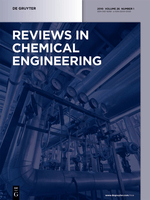
REVIEWS IN CHEMICAL ENGINEERING
Unveiling Cutting-edge Developments in the Field.REVIEWS IN CHEMICAL ENGINEERING, published by Walter de Gruyter GmbH, is a premier journal that delivers cutting-edge insights and comprehensive reviews in the field of chemical engineering. Established as an eminent resource since 1982, this journal is committed to advancing knowledge and fostering innovation in various domains of chemical engineering, including process design, materials, and environmental considerations. With an impressive Q1 ranking in the 2023 Scopus category for Chemical Engineering and a commendable 20th position out of 273 journals, it is recognized for its rigorous peer-review process and high-impact contributions. Although it operates under a subscription model, the journal remains a vital platform for researchers and professionals aiming to stay at the forefront of technological advancements and scholarly discourse in chemical engineering. With a focus on interdisciplinary applications and real-world relevance, REVIEWS IN CHEMICAL ENGINEERING is an indispensable resource for academics, industry professionals, and students dedicated to excellence in this field.
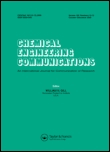
CHEMICAL ENGINEERING COMMUNICATIONS
Fostering Collaboration in Chemical Engineering Excellence.Chemical Engineering Communications, published by Taylor & Francis Inc, is a distinguished journal within the realms of Chemical Engineering and Chemistry. With an ISSN of 0098-6445, this journal plays a pivotal role in disseminating innovative research, critical reviews, and insightful discussions that encompass a broad spectrum of topics in these fields. The journal boasts a commendable Q2 ranking in the 2023 category of chemical engineering and general chemistry, reflecting its significant contribution to the scientific community. Operating under a rigorous peer-review process, the journal attracts high-quality submissions from global researchers. Although currently not an Open Access journal, it provides extensive archive access for users interested in exploring past advancements from its inception in 1973 through to 2024. With a commitment to advancing knowledge and fostering collaboration among academia and industry, Chemical Engineering Communications remains an essential resource for professionals and students aiming to stay abreast of the latest developments in chemical sciences.
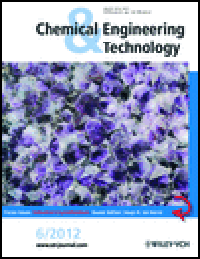
CHEMICAL ENGINEERING & TECHNOLOGY
Elevating Knowledge in Chemical Engineering and BeyondChemical Engineering & Technology is a prestigious journal published by Wiley-VCH Verlag GmbH, focusing on the evolving field of chemical engineering and its related disciplines. With an ISSN of 0930-7516 and E-ISSN of 1521-4125, the journal has established a robust platform for researchers and practitioners to share pioneering studies and innovative technologies within the field. Classified in the second quartile (Q2) across multiple categories such as Chemical Engineering, Chemistry, and Industrial and Manufacturing Engineering, it holds an impressive rank in the Scopus database, indicating its significant contribution to the academic community. The journal's commitment to advancing knowledge is reflected in its extensive convergence of research from 1987 to 2024, providing a comprehensive archive of scholarly work. Researchers, professionals, and students benefit from the latest insights and findings, enriching the dialogue around chemical processes and methodologies. Though it operates under a traditional subscription model, the accessibility of this journal is crucial for those engaged in both theoretical and applied aspects of chemical engineering.
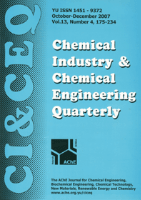
Chemical Industry & Chemical Engineering Quarterly
Advancing Chemical Engineering Knowledge, One Quarter at a Time.Chemical Industry & Chemical Engineering Quarterly is a distinguished, open-access journal published by ASSOC CHEMICAL ENG that serves as a vital platform for innovative research within the field of chemical engineering. Established in 2000 and actively disseminating knowledge since then, this journal has garnered acknowledgment for its contribution to the field, currently being ranked in the third quartile (Q3) of Chemical Engineering (Miscellaneous) for 2023. With a focus on advancing understanding of chemical processes and facilitating the integration of industry operations with engineering principles, it provides a forum for both theoretical and applied research. The journal is committed to maintaining high standards of academic rigor, supported by its indexed presence in Scopus, where it ranks #173 out of 273 in the general chemical engineering category. As an open-access journal, it promotes the rapid dissemination of research findings, enhancing accessibility for scholars, professionals, and students worldwide. Based in Serbia, the journal is an essential resource for those seeking to stay at the forefront of chemical engineering advancements.
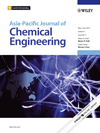
Asia-Pacific Journal of Chemical Engineering
Fostering Interdisciplinary Research for a Sustainable Future.The Asia-Pacific Journal of Chemical Engineering, published by WILEY, serves as a vital forum for the dissemination of innovative research in the interdisciplinary domains of chemical engineering, renewable energy, sustainability, and waste management. Established in 2006, this esteemed journal has achieved a notable impact factor that reflects its commitment to advancing knowledge and practices within the chemical engineering community. With its Q3 category rankings across various fields, including Chemical Engineering (Miscellaneous), Renewable Energy, Sustainability and the Environment, and Waste Management and Disposal, the journal holds a significant position among its peers, assuring readers of quality and relevance in published content. Although it does not offer Open Access options, the Asia-Pacific Journal of Chemical Engineering remains an essential resource for researchers, professionals, and students aiming to stay at the forefront of innovations affecting the Asia-Pacific region and beyond. The journal's broad scope covers diverse topics, making it an integral part of the academic landscape from 2006 to 2024.
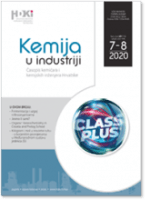
Kemija u Industriji-Journal of Chemists and Chemical Engineers
Advancing chemical innovation for a sustainable future.Kemija u Industriji - Journal of Chemists and Chemical Engineers is an esteemed open-access journal published by the HRVATSKO DRUSTVO KEMJIJSKIH INZENJERA I TEHNOLOGA, dedicated to advancing the field of chemical engineering and chemistry. Since its establishment, this journal has served as a pivotal platform for the dissemination of innovative research, technical development, and interdisciplinary studies within the chemical industry. With its ISSN 0022-9830 and E-ISSN 1334-9090, the journal has established a significant international presence, despite its historical discontinuation from Scopus coverage. Researchers and professionals seeking to contribute to or stay updated on the latest advancements in chemical processes, materials science, and engineering practices will find this journal invaluable. Its commitment to open access since 2004 ensures that knowledge is freely available, enhancing collaboration and learning among students, scientists, and engineers alike. With a legacy that reflects the rich tradition of chemical innovation, Kemija u Industriji continues to be a vital resource, promoting the scientific community's synergy and inspiring future breakthroughs.

Chemical Product and Process Modeling
Advancing the art of chemical engineering through innovative modeling.Chemical Product and Process Modeling is a vital academic journal published by WALTER DE GRUYTER GMBH, focusing on the intricate intersection of chemical engineering and mathematical modeling. Since its inception in 2006, this journal has been instrumental in disseminating significant research findings and methodologies that advance the modeling and simulation of chemical products and processes. With an ISSN of 1934-2659, it caters to a global audience from its base in Berlin, Germany. Although positioned within the Q3 and Q4 quartiles in Chemical Engineering and Modeling & Simulation categories respectively in 2023, it offers a platform for innovative approaches and contributions in these fields, making it a resource for researchers and industry experts alike. Access to the journal's content is offered through subscription models, enabling professionals and academics to stay abreast of the latest developments. In a rapidly evolving scientific landscape, Chemical Product and Process Modeling remains dedicated to enhancing knowledge and fostering collaboration within the chemical engineering community.
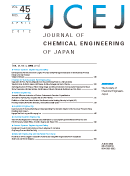
JOURNAL OF CHEMICAL ENGINEERING OF JAPAN
Bridging Tradition and Innovation in Chemical EngineeringJOURNAL OF CHEMICAL ENGINEERING OF JAPAN is a distinguished academic publication in the field of chemical engineering and chemistry, published by Taylor & Francis Ltd. With its ISSN 0021-9592 and E-ISSN 1881-1299, this journal has been a vital resource for researchers and practitioners since its inception in 1968 and continues to provide essential insights and advancements through 2024. The journal operates under an Open Access model as of 2023, promoting wider dissemination of research findings and encouraging collaboration within the global scientific community. Currently categorized in the Q4 quartile for both Chemical Engineering and Chemistry (miscellaneous) in 2023, it ranks within the lower percentiles of its respective fields, offering a platform for emerging scholars to publish their work and gain visibility. As part of Japan's academic landscape, it addresses numerous aspects of chemical engineering, fostering innovation and technical development that contribute to the industry's growth. Engaging with this journal is paramount for those looking to stay informed on the latest research trends and applications in chemical processes.

International Journal of Chemical Engineering
Connecting researchers to shape the future of chemistry.International Journal of Chemical Engineering is a leading peer-reviewed journal published by HINDAWI LTD, dedicated to advancing the field of chemical engineering through innovative research and practical applications. With an impact factor that places it in the Q2 category of Chemical Engineering (miscellaneous), this journal has established itself as a significant resource for researchers and professionals alike, particularly those interested in general chemical engineering topics. Since its transition to Open Access in 2008, the journal has ensured that critical scientific knowledge remains accessible to a global audience, fostering collaboration and interdisciplinary research. With coverage from 2009 to 2024, it continues to be an essential platform for disseminating cutting-edge findings, methodologies, and discussions that shape the future of chemical engineering. For more information, visit their website or access the latest issue directly to explore groundbreaking studies and insights.
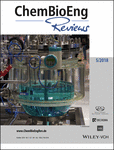
ChemBioEng Reviews
Advancing the Frontiers of Biochemical InnovationChemBioEng Reviews is a premier academic journal dedicated to advancing the fields of biochemistry, bioengineering, and chemical engineering. Published by WILEY-V C H VERLAG GMBH, this journal serves as an essential platform for researchers and professionals seeking to disseminate groundbreaking insights and innovations. With a remarkable impact factor and a solid reputation, it is ranked in the top quartile (Q1) across multiple disciplines, including Biochemistry, Bioengineering, and Industrial and Manufacturing Engineering. The journal's comprehensive scope covers the synthesis, analysis, and application of bioengineered solutions, making it a vital resource for anyone involved in process chemistry and technology. With an unwavering commitment to high-quality scientific discourse from 2014 to 2024, ChemBioEng Reviews is not only pivotal for the academic community but also contributes to industry advancements in filtration, separation processes, and the intersection of chemical and biological engineering.